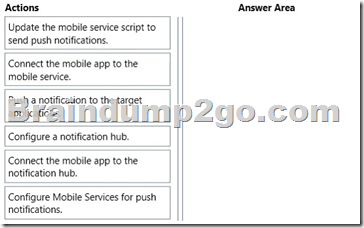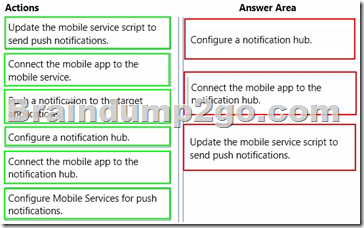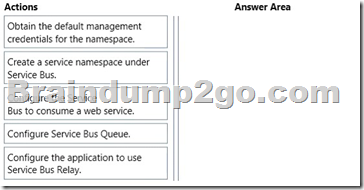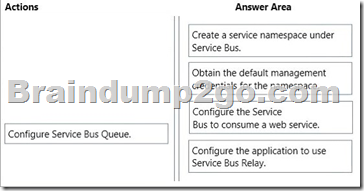2016/09 New 70-534: Architecting Microsoft Azure Solutions Exam Qustions Updated Today!
Instant Download 70-534 Exam Dumps (PDF & VCE) 166Q&As from Braindump2go.com Today!
100% Real Exam Questions! 100% Exam Pass Guaranteed!
1.|2016/09 New 70-534 Exam Dumps (PDF & VCE) 166Q&As Download:
ttp://www.braindump2go.com/70-534.html
2.|2016/09 New 70-534 Exam Questions & Answers:
Case Study 5 – Northwind traders (Question 69 – Question 74)
Background
Overview
Northwind Electric Cars is the premier provider of private, low-cost transportation in Denver. Northwind drivers are company employees who work together as a team. The founding partners believe that by hiring their drivers as employees, their drivers focus on providing a great customer experience. Northwind Electric Cars has a reputation for offering fast, reliable, and friendly service, due largely to their extensive network of drivers and their proprietary dispatching software named NorthRide.
Northwind Electric Cars drivers depend on frequent, automatic updates for the NorthRide mobile app. The Northwind management team is concerned about unplanned system downtime and slow connection speeds caused by high usage. Additionally, Northwind’s in- house data storage solution is unsustainable because of the new influx of customer data that is retained. Data backups are made periodically on DVDs and stored on-premises at corporate headquarters.
Apps
NorthRide App
Northwind drivers use the NorthRide app to meet customer pickup requests. The app uses a GPS transponder in each Northwind vehicle and Bing Maps APIs to monitor the location of each vehicle in the fleet in real time. NorthRide allows Northwind dispatchers to optimize their driver coverage throughout the city.
When new customers call, the dispatcher enters their pickup locations into NorthRide. NorthRide identifies the closest available driver. The dispatcher then contacts the driver with the pick-up details. This process usually results in a pick-up time that is far faster than the industry average.
Drivers use NorthRide to track the number of miles they drive and the number of customers they transport. Drivers also track their progress towards their established goals, which are measured by using key performance indicators (KPIs).
NorthRide App 2.0
Northwind Electric Cars is growing quickly. New callers often wait for their calls to be answered because the dispatchers are contacting their drivers to arrange pickups for other customers.
To support the growth of the business, Northwind’s development team completes an overhaul of the NorthRide system that it has named NorthRide 2.0. When a dispatcher enters a customer’s pickup location, the address and driving directions are automatically sent to the driver who is closest to the customer’s pickup location.
Drivers indicate their availability on the NorthRide mobile app and can view progress towards their KPI’s in real time. Drivers can also record customer ratings and feedback for each pickup.
Business Requirements
Apps
NorthRideFinder App
Northwind Electric Cars needs a customer-facing website and mobile app that allows customers to schedule pickups. Customers should also be able to create profiles that will help ensure the customer gets a ride faster by storing customer information.
Predictor App
Northwind Electric Cars needs a new solution named Predictor. Predictor is an employee- facing mobile app. The app predicts periods of high usage and popular pickup locations and provides various ways to view this predictive data. Northwind uses this information to better distribute its drivers. Northwind wants to use the latest Azure technology to create this solution.
Other Requirements
On-premises data must be constantly backed up.
Mobile data must be protected from loss, even if connectivity with the backend is lost.
Dispatch offices need to have seamless access to both their primary data center and the applications and services that are hosted in the Azure cloud. Connectivity needs to be redundant to on-premises and cloud services, while providing a way for each dispatch office to continue to operate even if one or all of the connection options fail.
The management team requires that operational data is accessible 24/7 from any office location.
Technical Requirements
Apps and Website
NorthRide / NorthRideFinder Apps:
– The solution must support on-premises and Azure data storage.
– The solution must scale as necessary based on the current number of concurrent users.
– Customer pickup requests from NorthRideFinder must be asynchronous.
– The customer pickup request system will be high in volume, and each request will have a short life span.
– Data for NorthRideFinder must be protected during a loss of connectivity.
– NorthRide users must authenticate to the company’s Azure Active Directory.
Northwind Public Website
– The customer website must use a WebJob to process profile images into thumbnails
– The customer website must be developed with lowest cost and difficulty in mind.
– The customer website must automatically scale to minimize response times for customers.
Other Requirements
Data Storage:
– The data storage must interface with an on-premises Microsoft SQL backend database.
– A disaster recovery system needs to be in place for large amounts of data that will backup to Azure.
– Backups must be fully automated and managed the Azure Management Portal.
– The recovery system for company data must use a hybrid solution to back up both the on-premises Microsoft SQL backend and any Azure storage.
Predictive Routing:
– An Azure solution must be used for prediction systems.
– Predictive analytics must be published as a web service and accessible by using the REST API.
Security:
– The NorthRide app must use an additional level of authentication other than the employee’s password.
– Access must be secured in NorthRide without opening a firewall port.
– Company policy prohibits inbound connections from internet callers to the on- premises network.
– Customer usernames in NorthRideFinder cannot exceed 10 characters.
– Customer data in NorthRideFinder can be received only by the user ID that is associated with the data.
QUESTION 69
You need to recommend a technology for processing customer pickup requests.
Which technology should you recommend?
A. Notification hub
B. Queue messaging
C. Mobile Service with push notifications
D. Service Bus messaging
Answer: D
Explanation:
Azure Service Bus Queue
Web Roles and Worker Roles can directly communicate with each other. However, a more common pattern is to use a reliable messaging system such as Azure Service Bus Queue to pass messages between them.
cloud service role: A cloud service role is comprised of application files and a configuration. A cloud service can have two types of role:
web role: A web role provides a dedicated Internet Information Services (IIS) web-server used for hosting front-end web applications.
worker role: Applications hosted within worker roles can run asynchronous, long-running or perpetual tasks independent of user interaction or input
QUESTION 70
You need to recommend the appropriate technology to provide the predictive analytics for passenger pickup.
What should you do?
A. Use Power BI to analyze the traffic data and PowerPivot to categorize the results.
B. Use HDInsight to analyze the traffic data and write a .NET program to categorize the results.
C. Use Machine Learning Studio to create a predictive model and publish the results as a web service.
D. Use Hadoop on-premises to analyze the traffic and produce a report that shows high traffic zones.
Answer: C
Explanation:
* Scenario: Predictive Routing:
/ An Azure solution must be used for prediction systems.
/ Predictive analytics must be published as a web service and accessible by using the REST API.
* Microsoft Azure Machine Learning Studio is a collaborative visual development environment that enables you to build, test, and deploy predictive analytics solutions that operate on your data. The Machine Learning service and development environment is cloud-based, provides compute resource and memory flexibility, and eliminates setup and installation concerns because you work through your web browser.
What is Azure Machine Learning Studio?
https://azure.microsoft.com/en-us/documentation/articles/machine-learning-what-is-ml-studio/
QUESTION 71
You need to design the authentication solution for the NorthRide app. Which solution should you use?
A. Azure Active Directory Basic with multi-factor authentication for the cloud and on- premises users.
B. Active Directory Domain Services with mutual authentication
C. Azure Active Directory Premium and add multi-factor authentication the for cloud users
D. Active Directory Domain Services with multi-factor authentication
Answer: C
Explanation:
* Scenario: The NorthRide app must use an additional level of authentication other than the employee’s password.
* Azure Multi-Factor Authentication is the multi-factor authentication service that requires users to also verify sign-ins using a mobile app, phone call or text message. It is available to use with Azure Active Directory, to secure on-premise resources with the Azure Multi-Factor Authentication Server, and with custom applications and directories using the SDK.
Incorrect answers:
Not A: Azure Active Directory Basic does not support multi-factor authentication. Azure Active Directory Premium is required.
What is Azure Multi-Factor Authentication?
https://azure.microsoft.com/en-us/documentation/articles/multi-factor-authentication/
Azure Active Directory Pricing
http://azure.microsoft.com/en-gb/pricing/details/active-directory/
QUESTION 72
Drag and Drop Question
You need to design the notification service for the customer-facing mobile app.
Which three actions should you perform in sequence? To answer, move the appropriate actions from the list of actions to the answer area and arrange them in the correct order.

Answer:

Explanation:
Azure Notification Hubs provide an easy-to-use infrastructure that enables you to send mobile push notifications from any backend (in the cloud or on-premises) to any mobile platform.
Configuration steps include:
1. Configure your Notification Hub
2. Connecting your app to the Notification Hub
3. Send notification from your back-end
You can send notifications using Notification Hubs from any back-end using the REST interface. You do this through a script, not a configuration of Mobile Services. Use Java or PHP for the script.
Getting Started with Notification Hubs
https://azure.microsoft.com/en-us/documentation/articles/notification-hubs-windows-storedotnet-get-started/#send-notification-from-your-back-end
QUESTION 73
Drag and Drop Question
You need to provide a data access solution for the NorthRide app.
Which four actions should you perform in sequence? To answer, move the appropriate actions from the list of actions to the answer area and arrange them in the correct order.

Answer:

Explanation:
Box 1: Create a service namespace under Service Bus
Box 2: Obtain the default management credentials for the namespace.
Box 3: Configure the Service Bus to consume a web service
Box 4: Configure the application to use Service Bus Relay
The Service Bus relay service enables you to build hybrid applications that run in both an Azure datacenter and your own on-premises enterprise environment. The Service Bus relay facilitates this by enabling you to securely expose Windows Communication Foundation (WCF) services that reside within a corporate enterprise network to the public cloud, without having to open a firewall connection, or require intrusive changes to a corporate network infrastructure.
QUESTION 74
You need to recommend a solution that meets the requirements for data storage for the NorthRide app.
What should you include in the recommendation?
A. Azure Remote App
B. Azure Service Bus
C. Azure Connect
D. Azure SQL Database
Answer: D
Explanation:
AZURE SQL DATABASE
Each SQL Database has three database replicas running at any given time.
In addition, SQL Database provides an automatic “Point in Time Restore” feature, which automatically backs up your SQL database and retains the backups for 7 days for Basic tier, 14 days for Standard tier, and 35 days for Premium tier.
Another fault tolerance feature you get automatically is “geo-restore.” When backing up your databases, Azure stores the most recent daily backup of your database in a different geographical location.
In the event of a large-scale outage in a region, your data can be restored within 24 hours from another region. If you have more aggressive recovery requirements, you can use “Standard georeplication” or “Active geo-replication.” Standard geo-replication (available to Standard and Premium-tier users) creates additional secondary replicas in a different region than the region in which your database is deployed (this region is called a paired region). These replicas are offline, but they can be brought online for an application to fail-over to them in the event of a datacenter disruption. Active geo-replication (available to Premium-tier users) provides the most rapid recovery time by keeping four geo-replicated live secondaries.
You can also manually back up your databases.
– First, you can create transactional consistent copies of your databases to the same or different servers in the same or different regions.
– Second, you can use SQL Database Import and Export Service to export BACPACK files, which contain a logical copy of the schema as well as the data of a database. You can then import the file back to your database for disaster recovery.
!!!RECOMMEND!!!
1.Braindump2go |2016/09 New 70-534 Exam Dumps (PDF & VCE) 166Q&As Download:
http://www.braindump2go.com/70-534.html
2.Braindump2go |2016/09 New 70-534 Exam Questions & Answers:
https://drive.google.com/folderview?id=0B75b5xYLjSSNfk01MGYzRmpvT1BUWUFIZTlaMWdqZms2N1EtVVVzVFo5VzJ4TDV2cERGeWc&usp=sharing